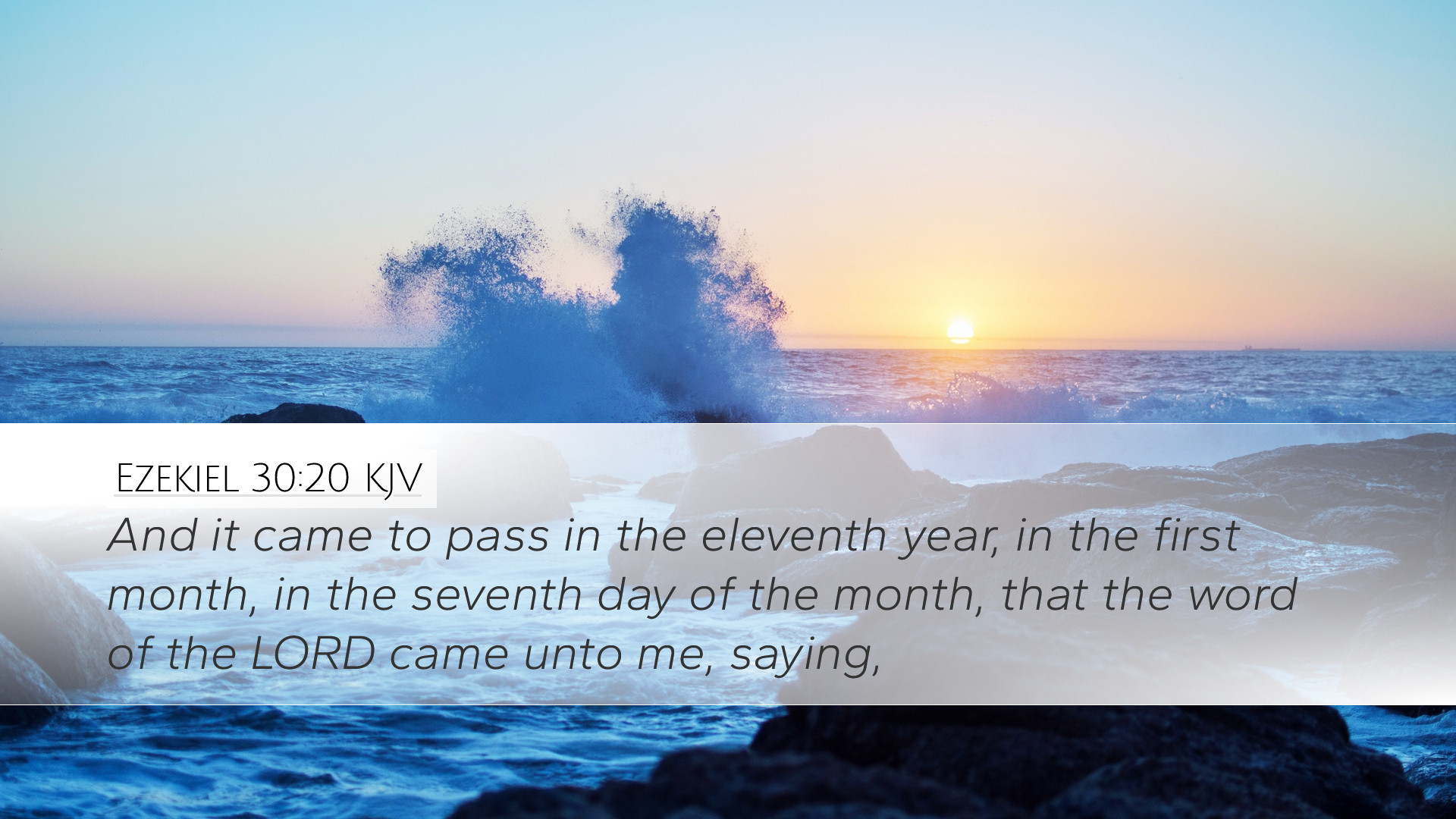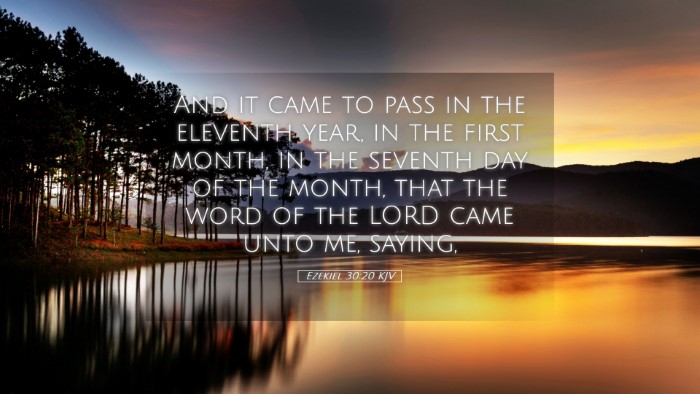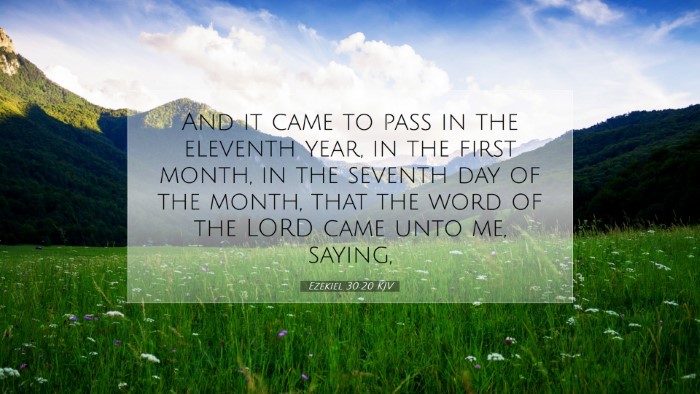Ezekiel 30:20 - A Commentary
Verse (Ezekiel 30:20): "And it came to pass in the eleventh year, in the first month, in the seventh day of the month, that the word of the LORD came unto me, saying,"
Introduction
The Book of Ezekiel presents a profound collection of prophecies, offering insights not only into the future of Israel but also into the oracles against various nations. Ezekiel 30:20 marks a significant point in these prophecies, bringing forth God's judgment upon Egypt and its surrounding nations. This commentary integrates insights from Matthew Henry, Albert Barnes, and Adam Clarke to explore the depth of this verse.
Contextual Background
The timing of this prophecy is essential for understanding its implications. The "eleventh year" refers to the period of the Babylonian captivity, a time of turmoil for Israel and Judah. Egypt, often seen as a haven for the exiled Israelites, is about to face God's judgment. This prophecy is not merely historical; it carries theological insights about God's sovereignty and the fate of nations.
Matthew Henry's Insights
Matthew Henry emphasizes the fulfillment of God's purposes in judgment against Egypt. He notes the precision of the timing—"in the first month, in the seventh day"—which aligns with the Jewish calendar and highlights the significance of God's message. Henry asserts that God's word comes with authority and precision, signifying that no nation, including the mighty Egypt, can stand against the purposes of God. He reflects on how God's judgments serve both as a warning to the nations and as a call for God's people to return to Him.
Albert Barnes' Exegesis
Albert Barnes provides a detailed exegesis of the verse, illuminating the historical context of Ezekiel's prophecies. He notes that the "word of the LORD" in this instance signifies a powerful declaration of impending judgment upon Egypt. Barnes explains that the specificity in the timing serves to assert the certainty of God's declaration. His commentary stresses that God’s Word can never fail, and the predetermined time illustrates God's omniscience and control over historical events. He concludes that God's communication through the prophet Ezekiel serves to strengthen the faith of the exiles, reassuring them that God remains actively involved in human affairs.
Insights from Adam Clarke
Adam Clarke, in his commentary, focuses on the prophetic nature of Ezekiel's message. He asserts that the reference to time in this verse underscores the importance of prophecy within the context of history. Clarke elaborates on the significance that the arrival of God’s word at this specific time indicates an impending crisis for Egypt, akin to the plagues during the Exodus. He posits that this serves as a reflection of God's relentless pursuit of justice and righteousness in the world. Clarke urges readers to recognize that the prophetic word is an invitation to repentance and a call to heed the warnings imposed by divine judgment.
Theological Implications
The implications of Ezekiel 30:20 are profound, especially concerning God's sovereignty, human agency, and the nature of divine justice. Each commentator reveals that the specificity of the timing not only anticipates the immediate ramifications for Egypt but also serves as a reminder of God's ultimate authority over nations.
Sovereignty of God
The sovereignty of God is a central theme in this passage. As highlighted by Henry, God’s supreme control over history is evident in His timing and prophecies. The precision of dates and events shows us that God orchestrates the affairs of men to fulfill His divine will. This raises the question of how modern believers understand God’s sovereignty, particularly in tumultuous times.
Human Agency and Responsibility
While God's sovereignty is established, so too is human agency. The call to repentance is imbued in the prophetic messages delivered through Ezekiel. Barnes suggests that God holds nations accountable for their actions. This duality between divine sovereignty and human responsibility is critical for both theologians and pastoral leaders, encouraging reflections on repentance and moral accountability in society today.
Justice and Righteousness
The concept of divine justice echoes throughout the commentary on this verse. Clarke’s insights emphasize that God’s judgments serve as a warning to nations that turn from their moral obligations. The repercussions faced by Egypt reflect a broader theological understanding of justice, where God’s timing in delivering judgment is perfect and intentional.
Conclusion
In summarizing the insights of Matthew Henry, Albert Barnes, and Adam Clarke, Ezekiel 30:20 stands as a significant testament to God's proactive engagement in human history and His unwavering justice against unrighteousness. For pastors, students, theologians, and scholars, this verse serves as a profound reminder of the importance of heeding God's warnings and recognizing His sovereign control over all nations. May the insights gleaned from this commentary drive deeper engagement with the Scriptures and inspire a commitment to righteousness and justice amidst a world fraught with challenge.


